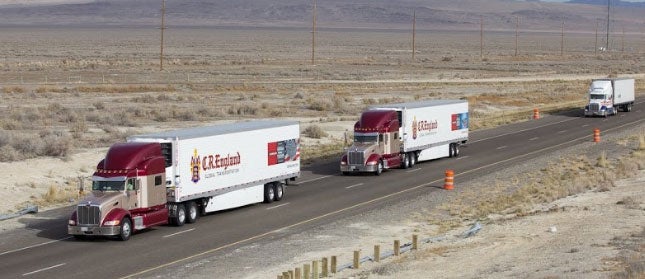
Good day,
While platooning vehicles are close to real-world operation, the world itself may not be ready for them. According to a guide for legislators created by the Competitive Enterprise Institute, the varied nature of state laws may limited where platooning vehicles may operate.
“With the coming advent of automated vehicles, numerous sections of state motor vehicle codes likely will need revision if we are to take advantage of the full range of benefits offered by vehicle automation technology,” wrote Marc Scribner. “Authorizing automated vehicle platoons in each jurisdiction merely requires exempting automated vehicle platoons from existing follow-too-closely (FTC) rules.”
If only it was that easy. Scribner notes that some states have several vehicle classes and FTC laws can sometimes stretch across classes. There are also time-based laws that stipulate the time interval between vehicles and other distance rules. For instance, in Alabama, a “driver of a vehicle shall leave a distance of at least 20 feet for each 10 miles per hour of speed between the vehicle that he or she is driving and the vehicle that he or she is following.”
For platoons, which travel as close as 40 feet, that law is a problem.
“A few U.S. jurisdictions lack explicit FTC rules, relying instead on broader reckless driving statutes,” Scribner writes. “A number of jurisdictions do not fully define all vehicle classes, which means the ‘car’ class becomes the default rule for all vehicles. Further, some jurisdictions distinguish between road types. A few jurisdictions have functionally identical rule types featuring different terminology, but these are rare exceptions.
“Exempting automated vehicle platoons from existing FTC rules is slightly more complicated in some jurisdictions, such as those in which FTC rules are spread through two or three class-specific statutory sections,” he adds. “For example, California’s FTC rules are divided into three separate statutory sections for cars, heavy trucks, and caravans. In addition, two jurisdictions, Alaska and Massachusetts, codify their FTC rules within administrative, rather than statutory codes.”
Scribner concludes that there are two approaches states can take to make vehicle platoons a reality.
“The first, the ‘strong amendment,’ is self-executing and would preclude the state from promulgating any regulations restricting automated vehicle platoons,” he writes. “This is the most liberal, strongly pro-market method of authorizing automated vehicle platooning. The second, the ‘weak amendment,’ would require agency implementation and grant state motor vehicle authorities discretion in how they promulgate platooning FTC rules, while providing a statutory backstop aimed at preventing excessively burdensome regulation.”
Did you know?
There are currently about 1.5 unemployed people for every job opening in the country. In 2010, that number was 7.5, according to a Transport Topics report.
Quotable:
“While overall truck volumes will continue to rise, and trucking will remain the dominant freight mode – its share of freight tonnage will dip to 67.2% by 2028, with pipelines picking up most of the additional marketshare, and, to a lesser extent, rail intermodal.”
– Bob Costello, ATA chief economist
In other news:
Rural America may be left behind in infrastructure plan
A new report suggests that urban centers will receive the bulk of any infrastructure investment under President Trump’s plan, which favors private investment that will want a return on investment. (APM Reports)
Driver shortage a worsening problem
The country’s low unemployment levels are making it even more difficult on carriers to find drivers, worsening a driver shortage that is already acute. (Transport Topics)
Majority of Americans support gas tax hike
A new Bloomberg poll finds that 55% of Americans support raising gas taxes to pay for infrastructure improvements. The support crosses party lines as well, with 51% of Republicans and 65% of Democrats supporting the idea. (Bloomberg)
Housing starts jump in June
Housing starts in June climbed 8.3%, easing, at least temporarily, a shortage of homes on the market, according to government data. (Wall Street Journal)
The cost to clean the ports
The Ports of Los Angeles and Long Beach have aggressive plans to rid the ports of diesel fuel emissions, but their plans could cost up to $14 billion, they said. (Long Beach Press Telegram)
Final Thoughts
Truck platoons hold a lot of promise for the industry and the future of goods movement, but like many technologies in the transportation space, the technology is ahead of the regulation. Given the time it takes for legislation to move through statehouses, state legislatures that have not addressed laws surrounding platoons need to do so quickly so society can benefit from the advantages of platoons.
Hammer down everyone!
